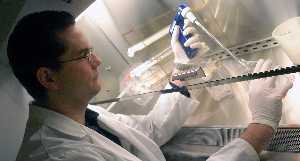 |
| Canada Research Chair in Inflammation and Immunity, Brent Johnston |
ItÕs the middle of the night. YouÕre at home, fast asleep, when suddenly, thereÕs a loud banging at the door. ItÕs the police Ñ somehow, they have mistaken you for a criminal and have come to arrest you!
According to Dr. Brent Johnston, this scenario is analogous to the action of the bodyÕs white blood cell "police" in inflammatory diseases like asthma and arthritis. Dr. Johnston, Canada Research Chair in Inflammation and Immunity, studies inflammatory diseases and the mechanisms that activate and regulate white blood cells. Having come to Halifax in January 2004 to join DalhousieÕs research community, itÕs a fortunate coincidence that he conducts research in the province with some of the highest rates of arthritis, childhood asthma, and cancer in Canada.
The bodyÕs police
Inflammatory diseases involve white blood cells, the bodyÕs police. Normally, they patrol the bloodstream looking for criminals like bacteria and other foreign pathogens; when thereÕs a problem, the white blood cells receive the "address" of the crime scene, and go to it immediately to apprehend the criminal. Arthritis, a primary focus of JohnstonÕs research, typically involves pain and swelling in the bodyÕs joints. It happens when white blood cells receive the wrong address, and attack otherwise healthy joint tissue.
A fascination with the bodyÕs innate ability to identify and deal with foreign pathogens inspired Dr. Johnston to pursue this research area. Along with two Masters students employed in his lab, he's improving health and quality of life by learning more about the mechanisms that trigger white blood cells to target an injury, a foreign pathogen, or healthy tissue. The knowledge gathered through this research has applications for other diseases, like asthma, inflammatory bowel diseases, and even cancer.
The cancer connection
The connection between arthritis and cancer may not be immediately apparent, however, Dr. Johnston says, "If you want to kill a cancer cell, youÕve got to get white blood cells to recognize and destroy the cancer cells. By understanding how white blood cells work, or donÕt work, in the case of arthritis, we can use this knowledge to enhance the bodyÕs own immune response and attack cancer cells more effectively." HeÕs currently ramping up a new research project to investigate white blood cell populations and their response to cancer cells.
Dr. Johnston works closely with other researchers in the Dalhousie Inflammation Group and doctors at HalifaxÕs IWK Health Centre. HeÕs also building partnerships with researchers at Stanford University, where he completed a post-doctoral fellowship, and New York University.
